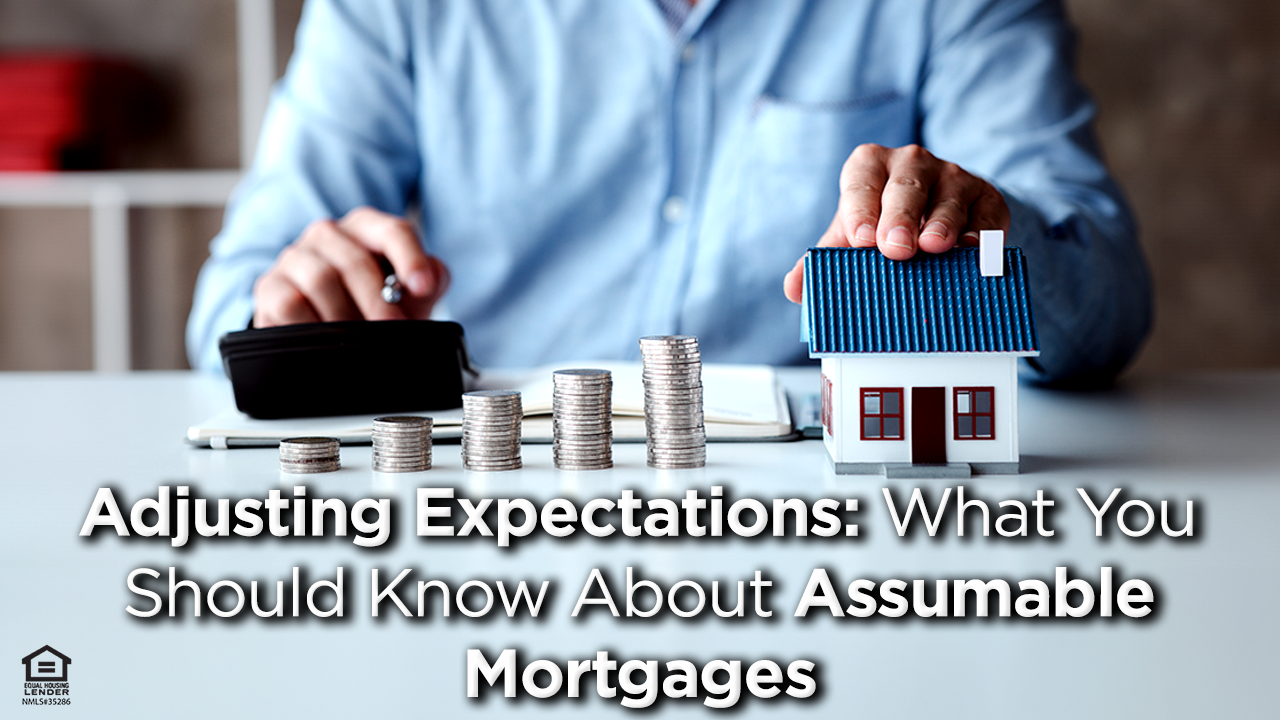
Adjusting Expectations: What You Should Know About Assumable Mortgages

Assumable mortgages have been dominating headlines as of late- but the grass isn't necessarily greener on the other side. Buyers have the opportunity to take advantage of financing with a significantly lower interest rate when buying a home with an assumable low-rate mortgage. The catch? You have to find one first.
What Is a Mortgage Loan Assumption?
A mortgage loan assumption occurs when a buyer becomes responsible for the existing loan of a willing seller. Think of it like stepping into the seller’s shoes: you’ll take their place as the person responsible for a loan that’s already partway paid off.
Which Loans Are Eligible?
FHA, USDA, and VA loans are the only loans eligible for assumption, and they can only be assumed by owner-occupant purchasers.
FHA Loans
To assume an FHA loan, borrowers will need to meet standard FHA loan requirements:
- Credit score of 580 or higher
Lenders must approve loans that originated on or after December 15, 1989, unless there are special circumstances, such as a death or an inheritance.
USDA Loans
To assume a USDA loan, most borrowers will need to meet standard USDA requirements:
- Credit score of 620 or higher
- Income and location restrictions apply
Transfers within families can assume the loan with the same rate and term without needing to meet eligibility requirements.
VA Loans
VA loans can be assumed by veterans and non-veterans alike.
However, it’s important to understand that only assumptions by another veteran with VA entitlement will release the original borrower’s entitlement
from the note by substituting the new buyer.
For loans originated after March 1, 1988, the lender must approve the assumption of a VA loan, typically by evaluating the creditworthiness of the borrower. Borrowers will typically need to have a credit score of 620 or above and will need to pay a 0.5 percent funding fee.
Loans originated before March 1, 1988 are considered “freely assumable.”
Conventional Adjustable-Rate Mortgage (ARM)
Some conventional ARMs are assumable. Fannie Mae may allow for assumable ARMs if the borrower agrees to give up the option to convert the mortgage to a fixed-rate loan. If a conventional ARM loan has been modified or deferred to avoid default, then it is no longer eligible for assumption.
Pros of an Assumable Mortgage
Assumable mortgages offer significant advantages to buyers and sellers alike.
Lower Interest Rates
Lower interest rates can save buyers thousands over the course of their loan. Sellers will have a significant marketing advantage in high-rate environments as well.
Simplified Selling Process
Mortgage loan assumptions are often simpler than applying for a conventional loan. There’s typically no need for an appraisal either, which saves buyers some additional time and money.
Examining the Numbers: Interest Rate Savings
If a seller has a $500,000 FHA loan that is 4% under the market interest rate, borrowers could save approximately $20,000 per year. If you account for the possibility of private mortgage insurance, the savings are $2,500 to $4,000 less, but still substantial overall.
Cons of an Assumable Mortgage
Increased Financial Risk
The grass isn’t always greener on the other side. Sellers often face additional risks with assumable mortgages, especially when it comes to VA loans.
If a buyer takes over a freely assumable mortgage and transfers ownership to a third party, sellers may still be responsible for covering any missed mortgage payments by the new owner. If sellers are unaware of the transaction, there’s an increased risk for default payments.
Potential for Lost Entitlement (VA Loans)
Sellers with assumed VA loans may lose their entitlement altogether if the new owner defaults, affecting their eligibility for future VA home loans. To prevent this scenario, sellers will need to obtain a release of liability after closing and provide proof to the Department of Veterans Affairs.
No Opportunity to Shop Around
Buyers are limited to the original terms and conditions of the seller's lender, restricting the ability to search for more competitive rates or terms.
May Need Significant Cash to Close and/or Down Payment Funds
The cost to assume a mortgage varies from home to home, too. In most instances, the less the seller has in a mortgage amount, the more the buyer will need to pay as a down payment for the property.
Examining the Numbers: The Cost of a Mortgage Loan Assumption
Buyers must accept the exact loan balance against the property. For example, if the loan balance is $500,000 and the property’s price is $650,000, buyers will need to come up with $150,000 plus closing costs.
Many borrowers do not have access to that much cash and may need to consider a 2nd mortgage to help bridge the gap.
Closing Thoughts
Assumable mortgages aren’t particularly common, but they are a viable strategy to navigate high-rate environments. Purchasing a home with an assumable mortgage can save you time, money, and effort, but it’s important to recognize that your choices will be limited and your down payment requirements may increase dramatically.
Every major financial decision deserves proper guidance and information. Give me a call or visit me online to determine the best financing strategies for you today.